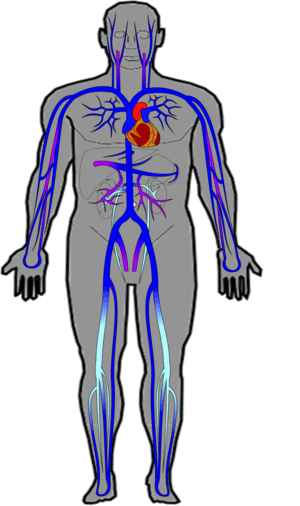Vein facts for kids
A vein is a type of blood vessel that carries blood back to your heart. Think of blood vessels as tiny roads inside your body. Most veins carry blood that has already delivered its oxygen to your body parts. This blood is low in oxygen. However, there are special veins, like the pulmonary vein (from your lungs) and umbilical veins (in babies before they are born), that carry blood rich in oxygen.
Contents
What Are Veins?
Veins are an important part of your circulatory system, which moves blood all around your body. While arteries carry blood away from the heart, veins bring it back. This journey is vital because your blood carries oxygen and nutrients to every cell, and then picks up waste products to be removed.
How Veins Work
Inside a vein, there's a wide space called a lumen. This space allows blood to flow easily. Veins also have lower pressure inside them compared to arteries. To make sure blood keeps moving towards the heart and doesn't flow backward, most veins have special one-way valves. These valves act like tiny doors that open to let blood through and then close to stop it from going the wrong way. The walls of veins are also a bit thinner and less muscular than arteries.
Different Kinds of Veins
All the blood from your body eventually returns to your heart through the vena cava. This is the largest vein in your body! But there are many other important veins too:
- Coronary veins are found on your heart itself. They collect blood that has been used by the heart muscle.
- Renal veins are connected to your kidneys. They carry blood away from the kidneys after they have cleaned it.
Why Veins Look Blue
You can often see veins just under your skin, especially on your arms or hands. They usually look blue or greenish. This is a bit of an optical illusion! The blood inside your veins is actually a dark red color because it's low in oxygen. When light hits your skin, the way it scatters and the way your eyes see color makes the veins appear blue. If a vein were cut, the dark red blood would quickly turn bright red as it mixes with oxygen in the air.
Images for kids
-
Branches of inferior vena cava
-
Image of veins from William Harvey's Exercitatio Anatomica de Motu Cordis et Sanguinis in Animalibus
See also
 In Spanish: Vena para niños
In Spanish: Vena para niños
 | Valerie Thomas |
 | Frederick McKinley Jones |
 | George Edward Alcorn Jr. |
 | Thomas Mensah |





